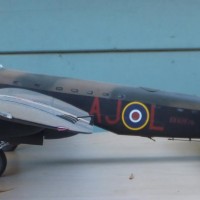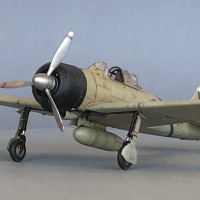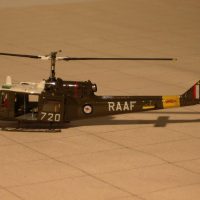Turning around Tamiya's 1/48 Seiran
The Aichi M6A1 Seiran is among prime Japanese aviation innovation projects during WWII. Created to be stored at and operated from specially designed submarines. Up to three of these float-equipped aircraft were able to take off from the sea after being rolled outside the submarine that served as an submersible aircraft carrier. The Japanese I-400 class submarines were built to host the Seiran and were the largest ever built, only to be surpassed in 1962 by nuclear-powered subs.
Fitting a high-performance combat aircraft into the confines of pressure-tight hull presented Aichi designers with an enormous challenge. To save space, the Japanese designed a 12-cylinder liquid-cooled Atsuta 32 engine based on the German Daimler-Benz DB603. Also, the entire aircraft could be assembled or disassembled in minutes, due not only to foldable wings, but also tail planes.
Originally, the aircraft were destined to disrupt shipping traffic in the area of the Panama Canal, but the cessations of hostilities prevented from the Imperial Japanese Navy to show its long reaching arm.
The Tamiya 1/48 Seiran kit was designed in close collaboration with the restoration work conducted on the only surviving Seiran at the NASM Garber facility.
I had the opportunity to visit the museum when the Seiran was at its initial stages of restoration, which revealed the archaeology of paint layers and internal structures of the wing fold mechanism. The two models that I built are the result of the visit.
Images of M6A1 undergoing restoration at the Garber facility of National Air and Space Museum, USA.
In the first, I concentrated on the layout of the aircraft in its stored phase inside the submarine. Not only the wings were folded, but also parts of the tail section. The aircraft were armed while in storage. I added the Edurad photoetched set designed for the kit, separated the canopy components, added a spare CMK DB603 engine and of course, folded the wings and tail sections using scratch made parts.
The second model represents the paint structure of a derelict aircraft. Unlike the camouflage paints that deteriorated in no time, it is known that the Japanese red primer holds on to the aluminium surface for many decades. I applied a Testors Metalizer a red enamel paint and a Tamiya IJN green on top. Then, I scratched the two upper paint layers to various degrees to depict a what if scenario in which the complete aircraft is discovered complete albeit tattered in a remote storing facility.




















Another masterpiece(es?), Rafi. Excellent paint and scratchbuilding. Congratulations!
Thank you Marvin!
What a fantastic dual project, Rafi! Excellent nob on both, superb painting and weathering!
Congratulations!
Thank you Spiros!
More fine work, Rafi! 👏 What an interesting model and article! 👍 Do you have all your finished models on display, Rafi? That must be an awesome collection, sir. 😃
Thank you Gary!
Many models are on display, but the new ones are stored back in boxes.
Very, VERY cool. A masterpiece.
Thank you Bob!
Excellent work especially on the partially stripped Seiran.
Thank you Dan.
Great work!
Thank you David!
Fantastic work on converting the model to this folded for storage version.
Thank you Tom.
Awesomely done!
Thank you Greg!
A pair of wonderful Seirans, Rafi @blackmopane
Being able to have a look at the real aircraft must have been an exciting moment.
Al the pictures you took definitely helped in building those two gems.
Thank you John.
My visit to the facility was inspiring and led to several model detailing projects.
Excellent dual project, and both are great builds.
Thank you Greg!
Great builds and fascinating subject! Thank you for the lesson on something I wasn't familiar with!
Thank you DJ.